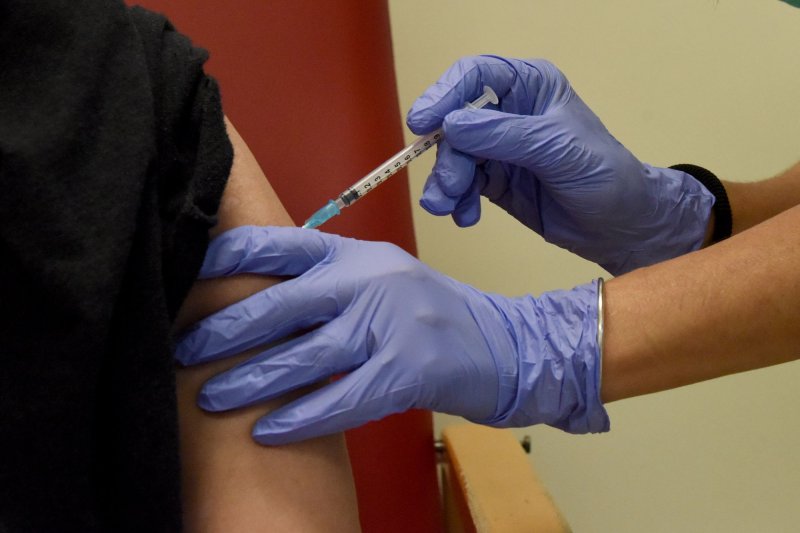1 of 2 | People who have been infected with COVID-19 may need only one dose of a two-shot vaccine to achieve immunity, but all may need a booster at some point, a new study has found. File Photo by Debbie Hill/UPI |
License Photo
June 23 (UPI) -- People who have had COVID-19 may not benefit from the second dose of the two-shot vaccines against the virus, a study published Wednesday by the journal ACS Nano found.
In the study, 36 people who had been infected with the virus and received the first dose of a two-dose vaccine had a sufficient immune response to provide maximum protection against reinfection, the researchers said.
The second dose of the vaccine provided no additional increase in antibody levels, they said.
Antibodies are cells produced by the immune system to fight off infection The COVID-19 vaccines are designed to stimulate production of these cells to help prevent severe disease.
Still, this antibody response, which creates immunity, wanes over time, suggesting that nearly everyone will need a "booster" dose of the vaccine at some point, according to the study.
"For those who have had COVID-19, they likely need only a single vaccination instead of the current regimen of two shots," study co-author Dr. Otto Yang told UPI in an email.
"People who haven't had COVID-19, however, need both vaccinations to reach reasonable levels of antibodies," said Yang, an infectious disease specialist at UCLA's Geffen School of Medicine.
In clinical trials, the Pfizer-BioNTech and Moderna COVID-19 vaccines, both of which normally require two doses, were up to 95% effective in protecting against severe COVID-19.
However, the clinical trials included very few people who had recovered from the disease, so their immune response is not as well known, Yang and his colleagues said.
For this study, the researchers measured antibodies against the coronavirus produced by people who received either the Pfizer-BioNTech or Moderna vaccine, as well as in unvaccinated people soon after mild or severe COVID-19 cases.
In 28 participants with no history of coronavirus infection, one dose of either vaccine triggered antibody levels similar to those seen following mild COVID-19 infections.
In these participants, however, two doses were needed to achieve the antibody response seen in people who experienced severe illness and to produce maximum protection.
In 36 participants who had COVID-19 before vaccination, the first dose produced an antibody response similar to that seen following severe natural infection. But the second dose produced no new antibodies, the researchers said.
After the second vaccine dose, antibody levels decreased in both groups by an average of 90% within 85 days.
Although researchers said more study is needed, they added this suggests that booster vaccinations most likely will be required for everyone.
"People who have had COVID-19 may enjoy a higher level of protection from vaccination than those who didn't have COVID-19."
However, "dropping levels of antibodies in everyone suggest that re-vaccination will be required, [as] antibodies fall over time regardless of prior COVID-19 status," he said.















